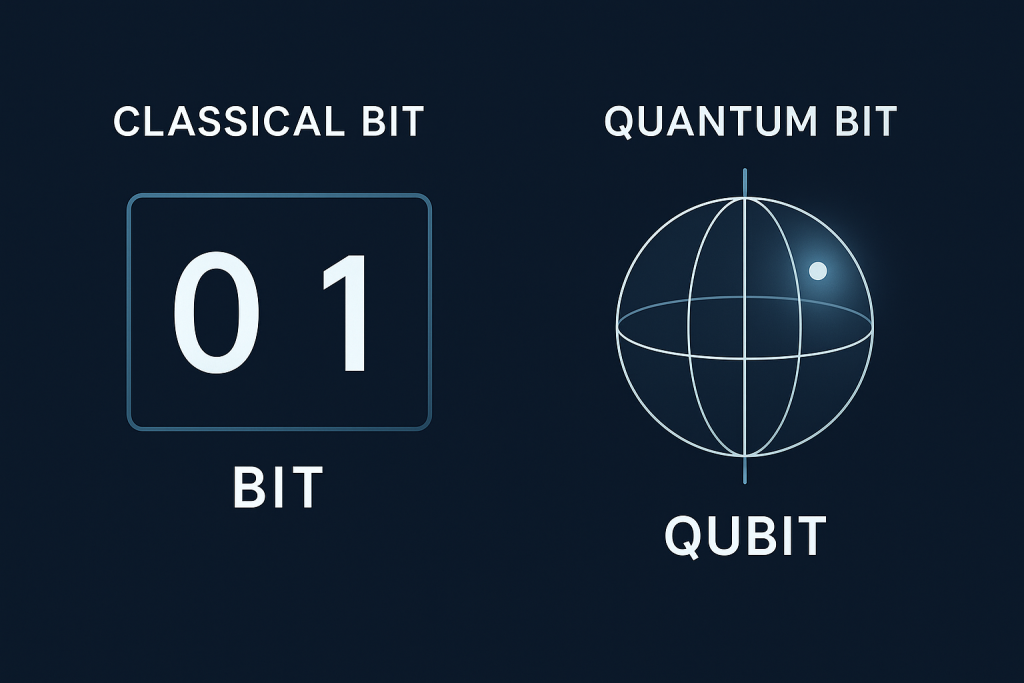The Evolution of Artificial Intelligence: Why We Need More
Artificial Intelligence (AI) is rapidly transforming industries — from automating vehicles and diagnosing diseases to predicting financial markets and optimizing logistics. But while AI has evolved dramatically in recent decades, it’s still bound by the limitations of classical computing.
Certain problems, especially those involving vast combinations or highly complex structures (like protein folding or multi-dimensional optimization), are either too slow or too complex for even the most powerful classical supercomputers. This is where quantum computing enters the stage — not to replace classical AI, but to empower it.
What Is a Quantum Computer?
At its core, a quantum computer operates using qubits (quantum bits) instead of classical bits. While a classical bit can be either 0 or 1, a qubit can exist in a superposition of both states at the same time. This means it can perform multiple calculations in parallel.
Moreover, quantum entanglement allows qubits to be linked in such a way that the state of one directly influences the other — regardless of distance. Combined, these properties allow quantum computers to explore solution spaces exponentially faster than classical machines in certain problem domains.
🧊 Example: A 3-qubit system can represent 8 different states simultaneously. A 300-qubit system could, in theory, represent more states than atoms in the universe.
What Is Quantum Artificial Intelligence?
Quantum AI is the intersection of quantum computing and machine learning. It involves designing algorithms that can run on quantum hardware to tackle AI-related tasks faster or more efficiently.
There are two main strategies in QAI:
-
Quantum-enhanced classical algorithms: These use quantum subroutines to accelerate specific parts of AI models (e.g., training or optimization).
-
Fully quantum algorithms: These run entirely on quantum circuits and leverage quantum effects like entanglement and interference throughout the model.
🛠️ Major Quantum AI Algorithms
Here are some of the most actively studied QAI algorithms:
🔹 Variational Quantum Eigensolver (VQE)
Primarily used in quantum chemistry to calculate ground state energies of molecules. It’s a hybrid algorithm that uses classical computers to optimize parameters of quantum circuits.
🔹 Quantum Approximate Optimization Algorithm (QAOA)
Designed for solving NP-hard optimization problems, such as scheduling, routing, or partitioning. It approximates solutions where exact computation is infeasible.
🔹 Variational Quantum Classifier (VQC)
A quantum version of classical classifiers like logistic regression. It works with small-scale datasets and is promising in fields like pattern recognition and NLP.
🔹 Quantum Kernel Methods
Inspired by support vector machines (SVMs), these methods compute high-dimensional kernel functions using quantum circuits for better feature separation.
📌 Note: Most of these algorithms are still in the NISQ (Noisy Intermediate-Scale Quantum) era — meaning they run on imperfect hardware and often require classical components.
Real-World Applications of Quantum AI
Quantum AI has the potential to revolutionize a wide range of fields:
| Domain | Application Example |
|---|---|
| 🧬 Drug Discovery | Simulating molecular interactions faster than current models |
| 💹 Finance | Portfolio optimization, fraud detection, risk modeling |
| 🚚 Logistics | Solving complex routing and scheduling problems |
| 🗣️ NLP | More efficient semantic search and language understanding |
| 🧠 Deep Learning | Faster neural network training with quantum acceleration |
Current Challenges and Limitations
Quantum AI, while promising, is still in its infancy. Key challenges include:
-
Hardware limitations: Quantum computers are fragile and highly sensitive to noise.
-
Error correction: Current quantum devices are error-prone and require new techniques for fault tolerance.
-
Data encoding: Translating classical data into qubit states is non-trivial and limits performance.
-
Scalability: Most real-world QAI models are only tested on small datasets due to hardware constraints.
What’s Next? The Road Ahead
-
Quantum advantage: Researchers are aiming to demonstrate clear, practical use-cases where quantum AI outperforms classical methods.
-
Hybrid systems: The future is likely to be hybrid — combining the strengths of classical and quantum processors.
-
Cloud-based QAI: Tech giants like IBM, Google, and Microsoft are offering Quantum-as-a-Service (QaaS) platforms to democratize access.
Final Thoughts
Quantum Artificial Intelligence is more than just a buzzword. It’s a growing field with the potential to transform how machines learn, think, and reason. While we are still years away from mainstream adoption, the foundations are being laid today by researchers, engineers, and visionaries worldwide.
As quantum hardware improves and algorithms mature, we may witness a future where AI doesn’t just simulate intelligence — it explores it in dimensions we’ve never imagined.


